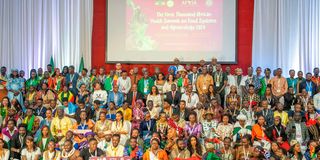Africa’s youth shaping the future of urban resilience

African youth meet in Addis Ababa, Ethiopia on October 14 to brainstorm and propose innovative solutions to address challenges facing the continent’s food systems.
What you need to know:
- Africa’s economies have been shaped by resource extraction, with limited integration into local or global markets.
- Africa’s young people are not just the future — they are the present leaders shaping the continent’s trajectory.
Africa, with its 54 diverse countries and 1.3 billion people, is united by a common strength: its youth. Over 60 per cent of the population is under 25, driving a growing sense of optimism about the continent’s future.
This optimism is rooted in the transformative potential of a well-educated, digitally connected generation demanding more from society.
Yet, this confidence stands in sharp contrast to the outdated and negative narrative often imposed on Africa — one that fixates on poverty and instability.
This narrative is driven by three key challenges: youth unemployment, rapid urbanization, and the worsening effects of climate change.
These challenges feed into each other, creating barriers to Africa's development but also opportunities for radical transformation.
First, mass youth unemployment is a critical issue.
Historically, Africa’s economies have been shaped by resource extraction, with limited integration into local or global markets.
This has left most young people with few formal job opportunities, pushing them into the informal economy, where stability and security are scarce. Secondly, urbanisation has been rapid and poorly managed, leading to informal settlements and inadequate infrastructure, minimal job creation in Africa's booming cities.
Finally, environmental degradation and climate change exacerbate these vulnerabilities, as floods, heatwaves, and droughts destroy homes, disrupt livelihoods, and destabilize communities.
These challenges, while significant, can also serve as the driving force behind Africa's renewal.
The continent's youthful population is growing fast and is projected to form the world’s largest labour force — over 1 billion strong by 2050.
To unlock the full potential of this labour force, there is an urgent need for investment in education, skills development, and innovation to hareness opportunities offered by the digital era.
Targeted support for youth entrepreneurship and micro-enterprises can formalize and transform the informal economy, tapping into the creativity and resilience of Africa’s young people.
Africa is also undergoing the fastest rate of urbanisation in history. By 2040, more than 60 per cent of its population will live in cities.
This rapid urbanisation, if managed well, offers tremendous economic opportunities. Historically, cities have been engines of growth, driving productivity and socio-economic transformation. Africa's cities are no exception.
There is a strong link between urbanization and economic growth, and by harnessing this, Africa can achieve its development goals.
Well-planned, inclusive urbanisation can turn cities into hubs of innovation and job creation.
The declaration of the first ever Africa Urban Forum held in September in Addis Ababa, called for strong engagement of youth in urban planning, decision making and search for solutions to climate change.
However, climate change is an ever-present threat. Africa contributes less than 4 per cent of global carbon emissions but is disproportionately impacted. Seven of the ten most climate-affected countries are in Africa.
As temperatures rise and water becomes scarcer, Africa’s cities, especially informal settlements, will become more vulnerable to climate shocks.
Yet, Africa also has an opportunity to become a leader in climate solutions. The continent is rich in renewable energy potential, and technological advancements have made it easier for African cities to adopt clean, sustainable energy solutions.
Many cities, particularly secondary ones, are still in their early stages of development, giving Africa the chance to design them with climate resilience in mind. By leapfrogging outdated technologies and embracing nature-based solutions, Africa’s cities can not only adapt to climate change but also thrive in the face of it.
Youth-led climate action is essential to this transformation. Africa’s young people are already advocating for bold climate policies and leading initiatives that promote sustainability and resilience at the local level.
With the right policies and investments, Africa’s youth can turn today’s challenges into tomorrow’s opportunities, driving transformative change across the continent.
Cities Alliance, UNOPS, UN-Habitat, and other international organizations are well-positioned to support these efforts by helping leverage investments into education, governance, infrastructure, and climate resilience, specially in the context of the establishment of the loss and damages funds and the upcoming COP 29, to make sure the aspiration of african youth is not overlooked
But to truly unlock Africa’s potential, a broad coalition of governments, international organizations, civil societies, and the private sector is needed. Collaboration at all levels is essential to empower Africa’s young people to build the resilient, inclusive cities of tomorrow.
Africa’s young people are not just the future — they are the present leaders shaping the continent’s trajectory. By harnessing their energy, innovation, and resilience, Africa can rise to the challenges of urbanisation and climate change, becoming a global leader in sustainable development and urban resilience.
Julian Baskin is the Senior Urban Advisor, Cities Alliance, Dalila Goncalves is the Regional Director for Africa, UNOPS, and Oumar Sylla is the Regional Director for Africa, UN-Habitat





